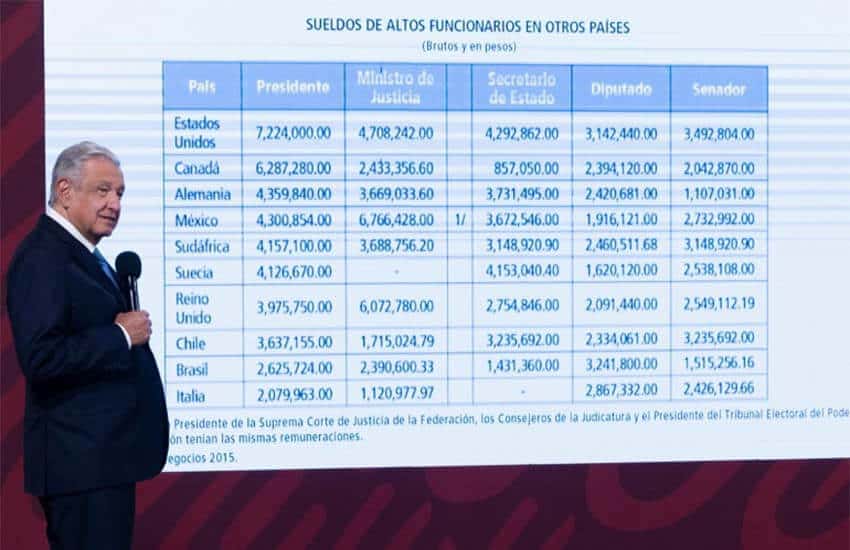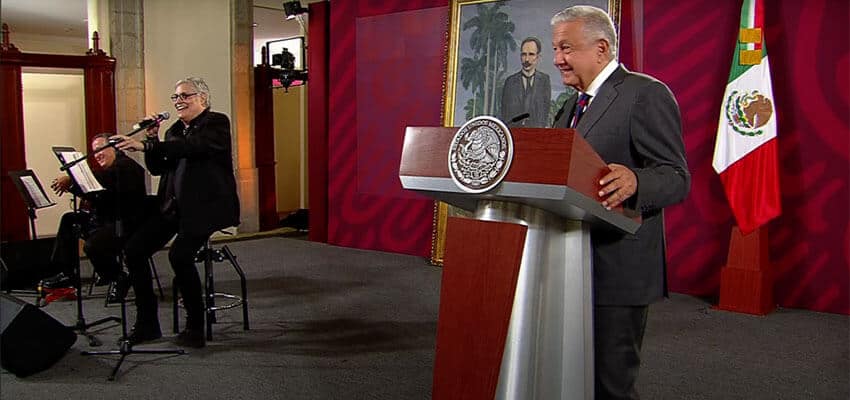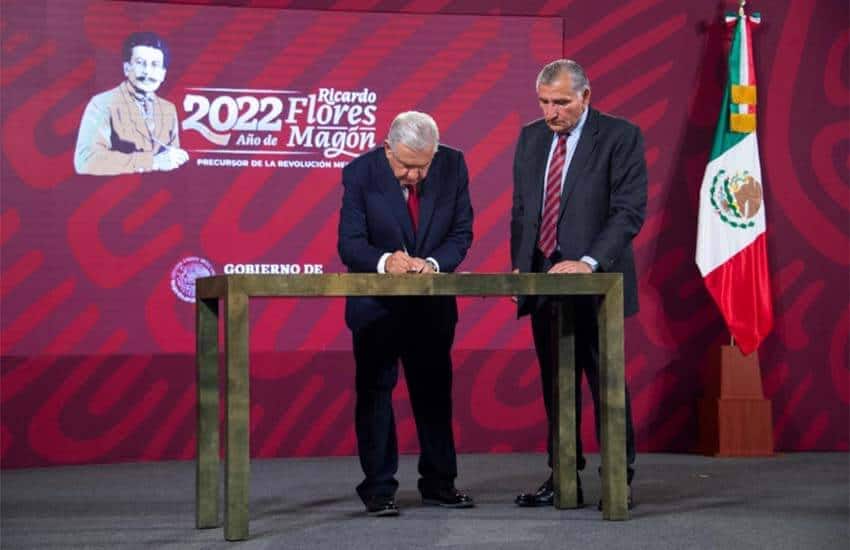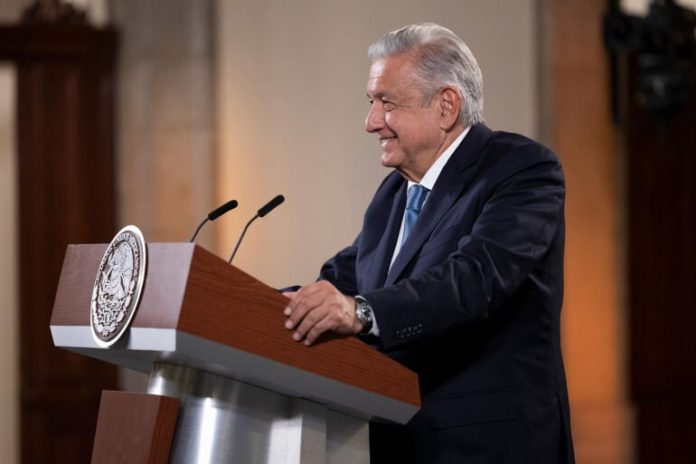President López Obrador was in Nayarit last weekend, eating seafood, checking up on a new canal and welcoming Cuban doctors.
Monday
As he had promised, the president revealed the salaries of Mexico’s public servants who earn more than him. Despite a law change obliging state workers to earn less than the head of the executive, some had “applied for amparos or did not care about what the constitution establishes,” the president said, referring to a legal defense often used as a delaying tactic.
The head of the consumer protection agency Profeco, Ricardo Sheffield, dished out the numbers and job titles. Among the 11 government officials earning more than AMLO are the Attorney General, Alejandro Gertz Manero; the head of the National Statistics Institute, Graciela Márquez; and the head of the National Electoral Institute, Lorenzo Córdova.
Other “little angels” in the judiciary, Sheffield added, were earning more than twice the president’s salary.

Further legal fog arose later in the conference when the president confirmed it was full steam ahead for his Maya Train project. “There is no legal problem,” he insisted, following renewed construction on the project, which was recently declared a project of national security despite a standing suspension order on construction from the courts.
The tabasqueño chief executive then detailed the pressing security threat to which the train’s national security designation referred: “A foreign government is intervening,” he said, naming the United States government as the offending foreign party. He also added that a loss of “the people’s money” due to delays was another security issue.
Tuesday
The next day, Cuba took center stage as the president commemorated a symbolic date of the Cuban Revolution. A lifesize painting of Cuban politician and poet José Martí hung at the back of the stage, and the president announced that one of his favorite Cuban singers, Amaury Pérez, would perform.
Foreign Minister Marcelo Ebrard also announced the return of 8,970 globally dispersed pieces of heritage art during AMLO’s administration. In a separate, somewhat counterintuitive victory, Ebrard said the U.S. would bump visas for Mexicans by 45,000 this year — from 310,000 — and that 55,000 U.S. visas would be available for Central Americans and Haitians.
“I want to … thank the president and his cabinet for the solidarity, the courage, the generosity with which they have been at Cuba’s side, defending Cuba, helping Cuba, understanding Cuba, opening up to Cuba in a brave way … I want to tell the president that Cuba … respects him and loves him,” Pérez said, backed by an acoustic guitarist providing a melody.
Pérez performed three songs, the second dedicated to the Mexican Catholic patroness the Virgin of Guadalupe.
“Should I sing another?” Pérez asked the room, met by an affirmative response from journalists. “That’s how the Mexican press is; I love them,” he told the gleeful reporters, who were probably long starved of affection at AMLO’s morning conferences.

“We’ve brought a lie and a piece of good news,” the government’s media monitor Elizabeth García Vilchis said to introduce her usual “Who’s who in the lies of the week” portion of Wednesday’s press conference. García assured that the press was wrong to link the “pothole” on a runway at Mexico City Airport (AICM) to the cancellation of the semi-built airport in Texcoco in 2018.
The large chunk of missing asphalt temporarily closed the runway at AICM days earlier.
García turned to Bloomberg for kinder reading, which had lauded “Mexico’s super peso.”
“Amid the carnage in emerging-market currencies this year, there’s been a surprisingly resilient outlier: the Mexican peso,” García read from the article, which pointed to Chinese factories moving to Mexico as a major contributor.
Yet, despite the super peso, the president announced that he was committed to even greater governmental frugality. “We are going to pass from the phase of republican austerity to a more advanced phase, that of Franciscan poverty,” he told reporters, referring to a Catholic order that forbade its members from owning property and forced them to beg while preaching.
In practice, the president said public servants would travel abroad less, before commending the fact that not a single new vehicle had been bought for state workers during the administration.
Thursday

After announcing severe belt-tightening on Wednesday, Thursday was a day to revel a bit in one’s accomplishments: 2.5 trillion pesos were saved through AMLO’s austerity plan in 2021, the president said, and this year, the government has saved even more.
Given the apparent strength of the coffers, AMLO was unperturbed by credit rating agency Moody’s prediction that Mexico was heading for a recession in 2023. “They are measurement models that go hand in hand with neoliberal politics but are in a clear decline; the neoliberal model is in crisis in the world,” he said.
“Honesty,” the president added “is the greatest wealth of Mexico … even if there is a crisis, if there is honesty, if there is no corruption, we can handle it.”
That resilience may soon be put to the test after the governments of the U.S. and Canada initiated legal proceedings over a possible breach of the USMCA trade agreement. Mexico’s two northern neighbors have complained that Mexico is unfairly favoring state energy companies.
“Even in the case of the most important market in the world, if having access … means us giving up sovereignty, we can’t accept it. We can’t hand over our independence to any foreign government,” the president insisted before reading Chapter 8 of the USMCA document, which protects Mexico’s ownership of hydrocarbons.
Friday
Discussion of an even more natural resource headed Friday’s conference: water. Access to clean water for drinking and sanitation is a human right, but it can be scarce in Mexico, where droughts are severe. Conversely, at some times of year, flooding can pose an even greater immediate threat.
The president signed a decree to support the Nuevo León government to ensure drinking water would remain available. Since early June, in the metropolis of Monterrey, running water has only been available six hours per day, if at all. López Obrador added that the state was a victim of its own success and that infrastructure hadn’t kept up with the growth of its population.
Later in the conference, there was more economic news to celebrate.
“I’m going to say it to boast a little. There was economic growth for the second quarter. We had 2% growth last quarter in relation to the previous one, while in other countries it is being reported that [economies] are declining,” the president announced, briefly before striding away to attend to the nation.
Mexico News Daily
